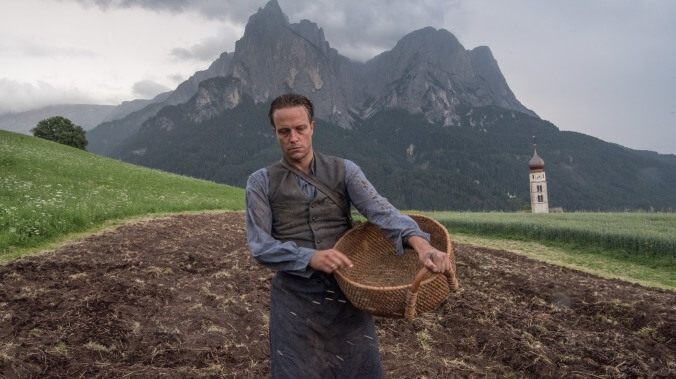There’s little doubt or drama in Terrence Malick’s 3-hour tribute to moral resistance, A Hidden Life

People lie constantly—to others and to themselves, quite casually or after swearing a solemn oath not to do so. Telling the truth when a lie would make things much easier is almost always admirable. But there’s a special sort of awe reserved for the person who refuses to say something that isn’t true even when that insistence on honesty means certain death. It’s one thing to sacrifice yourself in order to, say, avoid giving up information that could endanger others; it’s another, even more remarkable thing to decide that life isn’t worth living if it’s conditioned upon stating aloud that you believe two and two add up to five.
Terrence Malick’s A Hidden Life devotes nearly three hours to a real-life instance of such suicidal integrity. Franz Jägerstätter (August Diehl) and his wife Fani (Valerie Pachner) run a small farm in the Austrian mountains, and have no desire to do anything but work the land and raise their three daughters. When World War II breaks out, Franz, like every other Austrian and German man who’s not too young or too old, gets conscripted into the army, and he reluctantly endures basic training despite his hatred for the Nazi regime. We see enough capitulation to know that this man doesn’t have a death wish, nor see himself as a heroic resistance fighter—given the opportunity, he’d ride out the nightmare by keeping his head down and his mouth shut. Eventually, however, he’s called up to serve, which requires swearing allegiance to Hitler and the Third Reich. That Franz will not do, even under pain of torture, imprisonment, and threatened execution. The Nazis killed him in 1943, following a trial, and Malick used the surviving correspondence between Franz and Fani (frequently heard in voiceover) as the basis for his screenplay.
The very existence of a more or less traditional screenplay represents a departure from Malick’s recent work, as films like Knight Of Cups and Song To Song were reportedly almost entirely improvised (and looked like it, frankly). He’s still shooting in the same whirligig, free-associative style, though, and his penchant for monumental montage could scarcely be less suited to the tale of one man’s self-abnegating act of conscience. What’s stirring about martyrdom is the internal struggle, which offers rich dramatic possibilities: Paul Scofield won an Oscar for his performance as Sir Thomas More (executed for refusing to swear allegiance to Henry VIII’s Act of Succession) in A Man For All Seasons, and nobody who’s seen any version of Arthur Miller’s The Crucible can forget John Proctor, after intense coercion to sign a false confession, shouting that he cannot “Because it is my name! Because I will never have another in my life!” Despite its epic length, A Hidden Life offers nothing remotely so thoughtful or intense. Franz experiences no real doubt about what he must do, which makes the film’s depiction of his steadfastness feel hagiographic (or beatific, if you prefer; he was in fact posthumously beatified by the Catholic Church).
True to form, Malick often seems more compelled by the landscape than anything else. A Hidden Life’s working title was Radegund, after the name of the village where the Jägerstätters lived; Malick actually shot the bulk of the film in northern Italy, but he employs those gorgeous pastoral locations as counterpoint to the unseen violence happening elsewhere, implicitly equating their beauty with the family’s righteousness. That might have been more effective had Malick not spent his last several films beating certain visual affectations (e.g., the camera rushing first toward and then away from people as they wander through fields) into the ground. A Hidden Life is strongest in its third hour, when Franz is in jail awaiting trial; Malick employs the same swooping approach in claustrophobic surroundings, giving his camera’s restlessness an unexpected plangency, and Franz’s final moments, as he looks at various mundane earthly objects (a tree, some rocks) en route to the guillotine, is surpassingly lovely. For the most part, though, this is a frustratingly inert portrait of unwavering certitude. It’s as if Melville’s “Bartleby, The Scrivener”were actually about Bartleby, the clerk who responds to every request with “I would prefer not to.” There’s no mystery here, no narrator wrestling with the limits of his own generosity and tolerance. Just a lot of stunning scenery and exemplary rectitude.